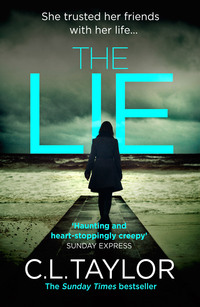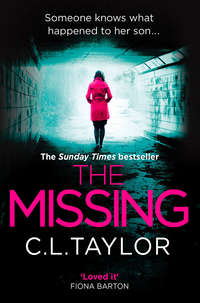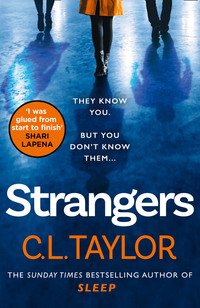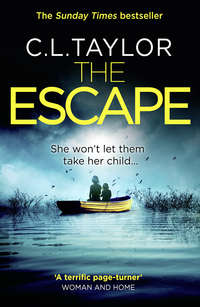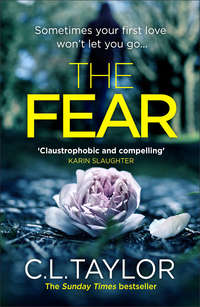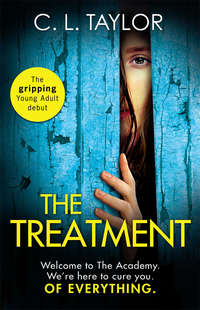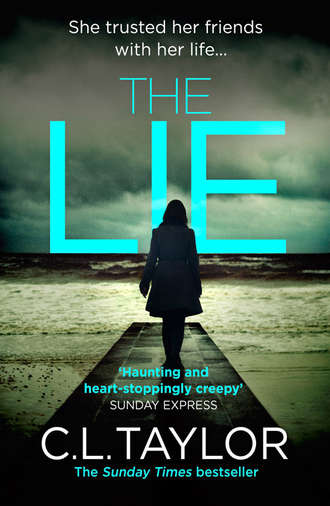
Полная версия
The Lie
“Ooh.” She raises her eyebrows and widens her eyes. “Sorry if I’m boring you, Miss Emma Woolfe. Are my storytelling skills lacking? I do apologise.”
“Well, I think you’re funny,” Leanne says. She’s sitting cross-legged on her chair, her bony knees poking over the arms, a thin grey cardigan wrapped around her shoulders.
“Thank you, darling.” Daisy takes a little bow then totters over to me. “What’s up with you, misery guts?”
“Nothing. Forget it.” I reach for my wine glass and stand up. “I’m going for a walk round the grounds. I’ll see you guys in a bit.”
I slip away quickly, Daisy’s mocking voice following me out into the darkness of the garden. She’s doing her “northern voice”, a cross between Yorkshire and Geordie. I’m not even a northerner – I’m from Leicester – but “everyone who lives north of Watford is a northerner”, according to Daisy. Daisy and Al both claim to be from London, but Al’s actually from East Croydon, while Daisy’s from Elmbridge in Surrey – “the Beverley Hills of Britain”, apparently, not that Daisy spends much time there. She went straight from Cheltenham Ladies College to university in Newcastle. Apparently, she was being groomed to go to Oxford or Cambridge, but she was more interested in shagging boys in the grounds after dark than studying for her A-levels, and only scraped three Cs. And then after uni we all moved to London.
“Daisy, you’re hilarious!” Leanne laughs at Daisy’s impression of me like it’s the funniest thing she’s ever heard. It’s been seven years since she first did it at uni, and apparently the joke still hasn’t worn thin.
I make my way slowly around the swimming pool, checking the wet tiles for snakes, lizards and frogs, then follow the winding steps down into the gardens. It’s darker here, away from the glare of the hotel lights and the glow of the fire, but the moon is full and bright and I head for the crest of the hill and perch on the edge of a wooden bench there. We’ve only been in Nepal for a couple of days and I still feel as though I’ve been transported onto another planet. Forty-eight hours ago, we were in Kathmandu, with its roaring, beeping, haphazard traffic, men on bicycles piled up with treacherous, wobbling loads and monkeys jumping from building to building, their young clinging to their chests. Now, in Pokhara, the Annapurna range looms like a dark dragon in the distance, while the lake below, black against the glittering lights of the city, glistens in the moonlight. London couldn’t feel further away than it does right now.
I take a sip of wine then place the glass on the ground. It wobbles precariously but doesn’t tip over. I’m drunker than I thought. The sound of someone shouting along to Madonna’s “Holiday” drifts across the night air towards me. There’s a pause, a loud splash from the swimming pool, and then the singing continues. It’s Al. The laughter is all part of the act that she’s okay, just like the ceremonial burning of Simone’s photo in the firepit earlier and the solemn promise to “never, ever, get involved with a baby dyke again”. Two thousand miles away and a bottle of red wine in her hand, and she’s over the love of her life. If only it were that easy.
Leanne joins in the singing, her thin reedy tones picking out the words “holiday” and “celebrate” then falling silent for the rest of the song because she doesn’t know the words. Al laughs and Leanne laughs, Al dances and Leanne dances, Al sings and Leanne sings. Leanne does exactly the same with Daisy – it’s her M.O. She reminds me of one of those birds who jump from one rhino’s back to another, hitching a ride, pecking for food and enjoying the protection of the bigger animal.
Movement from the bushes to my right makes me glance round. The leaves at the base rustle ever so slightly as a gecko creeps out. Its padded fingers grip the ground and its bulbous eyes swivel from side to side. I stare at it, transfixed. I’ve only ever seen a gecko in the zoo before. It’s strangely beautiful and almost other-worldly with its black, unblinking eyes.
“Here you are!” Daisy comes crashing down the steps towards me, a fresh bottle of wine in one hand, a glass in the other, a blanket thrown over her arm.
“Don’t hate me, Ems!” She throws herself onto the bench beside me and wraps her right arm around my neck, pulling me into her. Red wine sloshes out of the bottle and drips down the front of my swimsuit. “I was only having a laugh.”
“I know.” I peel the bottle from her fingers and place it on the floor then untangle myself from her arm, but she continues to push the blanket into my face in a clumsy attempt to mop up the wine. “But I wish you’d stop doing it at my expense.”
“Stop being so sensitive. It’s just a bit of fun.”
“Yeah, because I loved being the punchline of my family’s jokes as a kid.” I can hear the whiny, self-pitying tone in my voice but I can’t stop myself. Daisy’s an aggressive drunk; I’m a maudlin one.
“Oh, for God’s sake.” She lets out an exaggerated sigh. “Sometimes I think Leanne’s right.”
“What about?”
“You.”
I inch away from her. “Go on.”
“No.” She peers at me. She took her contacts out earlier because they were gritty at the end of the day, and she’s too vain to wear glasses. “You’ll get pissed off.”
“Tell me.”
“No.” A smile plays on her lips as she shakes her head. She’s so drunk this conversation has become a game. She knows it’s dangerous but she can’t stop herself from playing it.
“Just tell me, Daisy.”
“Okay, okay. Fine. She thinks you can be a bit of a misery guts, sometimes. You say stuff that lowers the mood. Your parents are doctors, they’re still together, your brothers and sister are successful and you’ve got a job that pays okay even if your boss is an arsehole. Compared to what Leanne’s been through, what the rest of us have been through, you haven’t really got that much to moan about. That’s all.”
“And you agree with Leanne, do you?”
“Sometimes.”
I stare at her in bewilderment. Seven years, Daisy and I have been best friends, and this is the first time she’s said anything about me being a drama queen. Leanne’s been trying to drive a wedge between us for years, ever since we met at uni. “The three amigos”, that’s how Leanne referred to herself, Daisy and Al when they stayed up in Newcastle for the first Christmas holidays because none of them wanted to go back to their families. I wanted to stay up with them too, but Mum pulled a guilt trip on me. She told me Granny wasn’t very well and how would I feel if I missed her last Christmas because I chose to get drunk with my friends instead (Granny’s still alive and well). Leanne went out of her way to exclude me when I came back in the New Year. She invited Al and Daisy to the cinema, to club nights and to dinner parties at their halls of residence, all the while telling Daisy that she’d invited me but I’d made excuses about revision and said no. I know Leanne and Daisy have been spending more time together in London than usual because they both work flexible hours, Daisy in the pub and Leanne in the salon, and consequently they’ve been “babysitting” Al in the run-up to the holiday, but I never once thought they’d spend their time slagging me off.
“Thanks, Daisy.” I stand up. “I try and talk to you about you taking the piss out of me and you use it as an excuse to have a dig at me.”
“Stop being so bloody sensitive.” She stands up too. “And anyway, that story wasn’t about you. It was about that tosser you pulled. That’s who I was taking the piss out of. It was funny.”
“It wasn’t funny. Elliot could have been run over.”
“Elliot, was it? And there was me thinking he was some random guy who was just after a shag. He was rude and he deserved to be kicked out of the taxi. I did you a favour, Emma.”
“No, you didn’t. You kicked him out because he called you a drunken bitch. Daisy, you threatened to find out where he worked and hunt him down if he shagged me and didn’t call afterwards.”
“And?”
Her eyes glitter. There’s no reasoning with her, not when she’s like this. The evening can only go one of two ways now – she’ll either have a raging argument, or she’ll pass out. And, if I keep quiet, hopefully it’ll be the latter.
No such luck. Daisy’s on a roll now and won’t shut up. “Because he tried to snog me, you know, Emma – lovely Elliot, who you’re so keen on defending. He was all over me while you were in the toilet at Love Lies. That’s the real reason I kicked him out of the taxi, not because he called me a drunken bitch but because he was a shit and he didn’t deserve you.”
I’m just about to respond when – “Surprise!” – Al leaps from the top step and lands next to Daisy. Still soaking from the pool, she wraps Daisy in a wet bear hug, and clamps a hand to her mouth. Daisy puts up a half-hearted fight to free herself, but she and Al both know it’s in jest. Al looks across at me, and smiles. “No arguing, you two. We’re on holiday, remember? Oh! Look at that gecko.”
“What gecko?” Leanne makes her way gingerly down the steps. She pulls the grey cardigan tighter around her shoulders but it doesn’t stop her shivering. “What are you two doing? We could hear you shouting from the pool.”
“Here.” Al crouches down on the ground and reaches out a hand to the creature. The gecko speeds away and zips under the bench.
“Leave it.” Daisy tugs at the black strap of Al’s swimsuit. “Let’s get some more wine and go back in the pool.”
“I’ve never seen one of those before.” Al peers intently under the bench.
“Al!” Daisy yanks her swimsuit again, but this time she’s swatted away.
“Not now, Dais.”
The playful expression on Daisy’s face vanishes, and she twists away, wrapping her arms around herself as she turns her back to us and looks out towards the lake.
“I’m going to get my camera. Come with me and grab a blanket.” Al stands up and gestures at Leanne, who’s still standing on the bottom step, staring at us through the darkness. “You look cold.”
“Yeah.” Leanne hesitates. She can sense tension between us and she’s torn between going after Al and staying to find out what’s happened.
“Come on,” Al urges, grabbing Leanne by the elbow and angling her up the stairs, “we’ll grab some more wine, too. I think the hotel manager’s still awake.”
Daisy doesn’t acknowledge Al and Leanne’s departure as they stumble up the steps and crash through the undergrowth. Instead she continues to stare out at the lake. I head for the steps too. Staying and arguing isn’t going to solve anything. We’re drunk, we’re tired and we need to sleep.
“Is this how it’s going to be?”
“Sorry?” I turn back.
“This. Is this how it’s going to be? You and Al making excuses not to spend time with me?”
It’s at times like this that I wonder how much more I can take. Daisy pushes and pushes and pushes, almost as though she’s deliberately stretching the boundaries of our friendship to see how much I’ll put up with. If I stay, she’ll berate me for being a walkover, for not standing up for myself; if I go, I prove her theory that everyone will eventually abandon her. It’s a catch-22 situation.
“Don’t look at me like you don’t know what I’m talking about, Emma. First you wander off when we’re all having fun round the fire, then Al shrugs me off when I ask her to go in the pool with me. And then there was our first night in Kathmandu when you and Al pretended to be jetlagged instead of carrying on drinking with me.”
“We were jetlagged.”
“You were laughing and drinking beer in your room. Why couldn’t you have done that in a bar with me?”
“Daisy, it was one can each, hardly a party. Come on.” I take a step towards her and put a hand on her shoulder. “You need to go to bed.”
“No.” She shrugs off my attempt to drape the blanket over her, swiping it away, knocking it to the ground. “I don’t want to go to sleep. I want another drink and I want to go back in the pool. Where’s my wine?”
She glances towards the bench. The bottle of wine is on the ground where I left it. The gecko has moved back out from under the bench and is a couple of centimetres from the wine bottle.
“I don’t think you need any more wine, Daisy.”
“Don’t tell me what I need.”
She pushes me out of the way and totters towards the bench. The gecko scuttles towards the wine bottle. Daisy slows her pace, inching forward on the toes of her cork wedges as though she’s taking care not to startle the creature. I keep expecting the gecko to zoom off as she approaches, but it doesn’t move. It grips the ground by the wine bottle with its suction-like feet, the only movement the back and forth motion of its eyes.
Daisy stops walking. She bends at the waist and reaches her right hand towards the wine bottle. Her left leg twitches, she steps forward, and she stamps the gecko into the ground with the sole of her wedged sandal. At the same time, she grasps the neck of the wine bottle and whips it into the air. She glances round at me, her expression victorious. “Got it!”
I stare at her in disbelief. She just stamped on the gecko. Deliberately. The pause, the leg twitch, the step. She didn’t need to do any of that to get the wine bottle. She was close enough just to grab it.
“What are you staring at me like that for?” She raises the bottle to her lips and takes a swig.
“You just stamped on the gecko.”
“Did I?” She hops on one leg and grabs her left ankle with her right hand. She hoiks it up for a closer look, squinting into the gloom, then promptly unbalances and has to grab the bench to stay upright. “Fuck.”
“Didn’t you see it? It was right next to the bottle.”
“Was it? I can’t see a thing in this light. Come on.” She loops her arm through mine. “Let’s go and see what the other two are up to.”
Chapter 9
“You okay?” Al touches the back of my hand. “You didn’t come to breakfast.”
“I couldn’t find my tablets.”
We’re sitting on the back seat of the rusty, ramshackle bus that will take us to the base of the mountain so we can trek up to the retreat. It’s a lot more rickety than the bus that took us from Kathmandu to Pokhara but, according to Leanne, this journey will only take half an hour rather than a six-hour slog. I made it on the bus first and took a seat by the window, folding up my waterproof jacket to cover the springs poking through the ripped leather seat. Al, Leanne and a sunglasses-wearing Daisy filed on several minutes later. Al immediately tucked herself in next to me.
“Not your malaria tablets?”
“No, the anti-anxiety ones. I looked everywhere. I’m sure I packed them.”
“They’ll be in a side pocket, or something. Don’t worry, I’ll help you look once we get to Skanky Yaka, or whatever it’s called.”
“Cheers, Al.”
We lapse into hungover silence. We didn’t carry on drinking for long last night. When we returned to the patio, Leanne had already gone to bed, and, with no sign of the hotel manager, we only had Daisy’s half bottle of wine to drink between the three of us. By the time I dragged myself into the room I was sharing with Leanne, she was snoring softly.
I glance across the bus. Leanne’s laughing uproariously at something Daisy’s just said. She looks remarkably fresh-faced in her My Little Pony T-shirt and skinny jeans, while Daisy looks like she dragged herself out of bed and crawled into her clothes. She notices me staring and presses a hand to the side of her head.
“You as hungover as me?” she asks.
I nod. “I feel like hell.”
Satisfied with the response, she sits back in her seat and whispers something to Leanne, who glances at me and laughs.
I close my eyes to try and conjure up the memory of Daisy stamping on the gecko, but the images in my mind are blurred by my hangover and lack of sleep. If she couldn’t focus on me without her contact lenses in, and I was sitting across from her on the bench, how could she even have seen it? I’m misremembering what happened. I have to be. There’s no way she deliberately stamped on a living creature, not after the accusations her mum levelled at her when her sister died.
Al snorts with laugher beside me, and I open my eyes.
“I don’t suppose you got a photo of that gecko, did you?” she says. “I just remembered I was supposed to get my camera, but I was so obsessed with finding more booze I completely forgot about it.”
“No.” I shake my head. “No, I didn’t.”
“No worries.” She shrugs. “I’m sure we’ll see loads more.”
Thankfully, we arrive at the Maoist station within minutes. Their desk is on a platform at the end of the rickety bridge that connects the café at the base of the mountain with the start of the trail. None of us are shocked to see them there – you’re warned about the “tourist tax” in all good guidebooks – but the guns they clutch to their sides take us all by surprise. Shankar, our trek guide, nods for us to approach. I try to read his expression. While many Nepalese people support the Maoists, others are fearful of them. But Shankar’s eyes give away nothing of his thoughts.
Daisy approaches the desk first, her shoulders back, chin high. She runs a hand through her hair and smiles at the man behind the desk as she hands him her passport, trek visa and 150 rupees, but he doesn’t acknowledge her. His expression doesn’t change as he flips through the passport and then slides the money to the man at his left, who slips the notes into a money belt around his waist. Daisy reaches for her passport then jumps as the man slaps his hand on top of it.
“I tell you when to take,” says the man behind the desk. He stares at her for an unbearably long time then lowers his eyes to her visa on the desk in front of him. He flips the passport open again and compares the name on the visa with the name on the passport, then looks back up at Daisy.
“Why you here?”
“Um …” She clears her throat. “Just to trek up to the summit.”
Leanne has told us what to say. She seems to think the Maoists will charge us extra if they think we’re going to be staying in a Western establishment rather than one of the Nepalese-owned hostels.
“You sure about that?” He continues to stare at her.
“Of course. I’m dying to see the view from the top. It’s supposed to be amazing.”
He pushes Daisy’s possessions across the desk towards her then dismisses her with a wave of his hand. He doesn’t speak to Al, Leanne or me, and our documents are processed wordlessly. When we’ve been checked, the two armed men standing either side of the gate take a step back to let us enter the trail.
Daisy grabs my arm the second we’re all through. “Wow.” She pushes her sunglasses onto the top of her head. She has bags under her eyes, and dozens of red blood vessels streak the white around her eyeballs. “That was mental.”
She releases me and links her arm through Shankar’s before striding off up the path. If she notices him flinching at the unwanted physical contact, she doesn’t let on.
The muscles in my thighs burn from weaving my way from left to right and back again as I climb the three thousand steps up the Annapurna mountain. I was expecting actual steps – I think we all were – but these aren’t evenly sized concrete blocks; they’re slabs of rock, dug into the side of the mountain, so uneven and wonky you have to look where you’re placing your feet. They’re the rustic, higgledy-piggledy winding steps of a fairytale. Or a nightmare. With the exception of Al, we all go to a gym back home in London, but running 5K in thirty-three minutes on a treadmill prepares you for this in the same way that jumping in puddles prepares you to swim the English Channel.
It’s 2 p.m. and Shankar is leading the way, leaping from stone to stone, as enthusiastic and energised as he was when we started our trek five hours ago. Daisy and Leanne follow in his steps, both breathing heavily, both swearing whenever they look up and see how many more steps there are to go until we reach the end of the trail. Green mountains striped with brown paddy fields and capped with snowy peaks wrap around us, hiding us from the rest of the world. I have never been anywhere so breathtakingly beautiful or so back-breakingly harsh. We passed donkeys earlier, roped together, stumbling up the steps with huge saddle bags strapped to their backs, their knees buckling, their hooves slipping under the weight of their heavy loads. One of the donkeys was carrying a fridge, strapped on top of its saddle bag like it was the most normal thing in the world. Watching the poor animals climb and stumble, heads down, eyes sad, was more than I could bear. I wanted to set them free and tell their handler that he was cruel for forcing them to live such a miserable life, but I bit my tongue.
Al trails behind me, her face puce, her enormous backpack waving from side to side with each step she takes, the belt undone around her waist, her hands on her hips. Every dozen or so steps she stops, takes a puff of her asthma inhaler and continues on again. If I were Al, I’d ask to slow down or take more breaks, but she’s ox-like in her determination to get to the retreat before nightfall and hasn’t complained once. I hear the puff-puff of her inhaler and stop walking. That’s twice in the last five minutes.
“You okay?”
She shrugs off her backpack then bends forward and grips her knees with her hands. She sucks at the mountain air like a fish on a hook.
I put a hand on her shoulder. “Stand upright if you can. Leaning over like that squashes your lungs.” My brother Henry had asthma as a child, so her attack doesn’t faze me. Though the fact that we’re 3,500 metres above sea level and at least five and a half hours away from the nearest hospital does.
Al straightens up, puts her hands on her hips and cranes her chin towards the sky as she continues to gulp in air. Her cheeks are still a violent shade of red, but it’s not them I’m looking at. It’s her lips. They’re pink, not blue. That’s a good sign.
“Nice deep breaths,” I say. “Slowly. Don’t panic. In … and out … in … and out … Relax your shoulders. You’re tensing them because you’re scared. Relax your shoulders and exhale for as long as you can, then a nice deep breath in again.”
I can hear Daisy’s voice in my head as I speak, saying the exact same words to me a couple of months ago when I was in the grip of a panic attack. We were in a crowded cinema, people filling every seat, and it was hot, really hot. We were watching a thriller Daisy wanted to see and each time the main character jumped, I jumped. Each time she saw shadows where there weren’t any I saw them too. As her world grew smaller and more claustrophobic, so did mine, and I became convinced that there wasn’t enough air in the cinema for everyone to breathe, and I had to get out.
“Everything okay, miss?”
Our guide nimbly picks his way back down the mountain towards us, his tiny rucksack strapped to his back. Shankar’s weather-beaten face is as lined as befits a man in his late forties, but he moves like a man twenty years younger.
“She breathe okay?” he asks as he reaches us.
“No. She’s not. I think the altitude might be affecting her asthma. Maybe we should go back down.”
“No!” Leanne says so loudly I jump. I hadn’t realised she and Daisy had joined us too.
“I’m sorry?”
“We … we should carry on,” she says, the base of her neck colouring. “It can’t be much further to the retreat, and they might have a doctor or a nurse there.”
“But if the altitude is making her asthma worse, the best thing for her to do is go down again,” Daisy says.
I nod in agreement. Thousands of people do this trek every year, but occasionally people die. None of us wants to be part of that statistic.
“I still think we should continue to the retreat,” Leanne says. She glances from Al to the steps, as though she’s desperately hoping Ekanta Yatra will magically appear before us. “We’ve come this far. It would be such a shame to give up now. You can make it a little bit further, can’t you, Al? We can take it slowly, take lots of breaks. And like I said, I’m sure there will be someone there who can help.”


